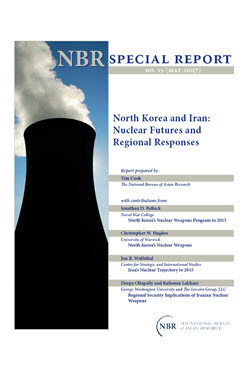NBR Special Report no. 13
North Korea and Iran
Nuclear Futures and Regional Reponses
This special report features abridged versions of four papers presented at the December 2006 workshop “Asian Proliferation 2015: North Korea, Iran, and Consequences for the Global Nonproliferation Regime,” two of which estimate the plausible technical nature of the nuclear programs in North Korea and Iran in 2015, and two of which evaluate conceivable regional responses to the more challenging security environments that nuclear weapons would create in each region.
International efforts to halt the nuclear weapons programs of North Korea and Iran have reached a critical juncture. Although there is still time to employ diplomacy and technology denial tools to slow or halt the nuclear programs in these countries, nuclear advancements in each suggest that the window of opportunity may be closing if the international community hopes to mitigate the threats North Korea and Iran pose not only to security in Northeast and Southwest Asia but also to international security.
This special report features abridged versions of four papers presented at the December 2006 workshop “Asian Proliferation 2015: North Korea, Iran, and Consequences for the Global Nonproliferation Regime,” two of which estimate the plausible technical nature of the nuclear programs in North Korea and Iran in 2015, and two of which evaluate conceivable regional responses to the more challenging security environments that nuclear weapons would create in each region. Taken together, the papers and the discussion that emerged produced three counter-intuitive findings and related policy implications in regard to North Korean and Iranian nuclear advances:
- Not imminent, nor immediate: Despite an actual nuclear test by North Korea and continued advances on uranium enrichment by Iran, the threats North Korea and Iran pose to regional and international security are not immediate, and the development of a usable weapons capability by each is not imminent.
- Iran is a greater potential threat: Although North Korea’s nuclear program is technologically more advanced, Iran’s program poses a greater threat to regional and international security.
- Japan is the linchpin of security in Northeast Asia: A nuclear arms race is unlikely in Northeast Asia as a direct result of North Korea’s possession of nuclear weapons, but would be more likely if Japan opted to develop a nuclear deterrent of its own.


